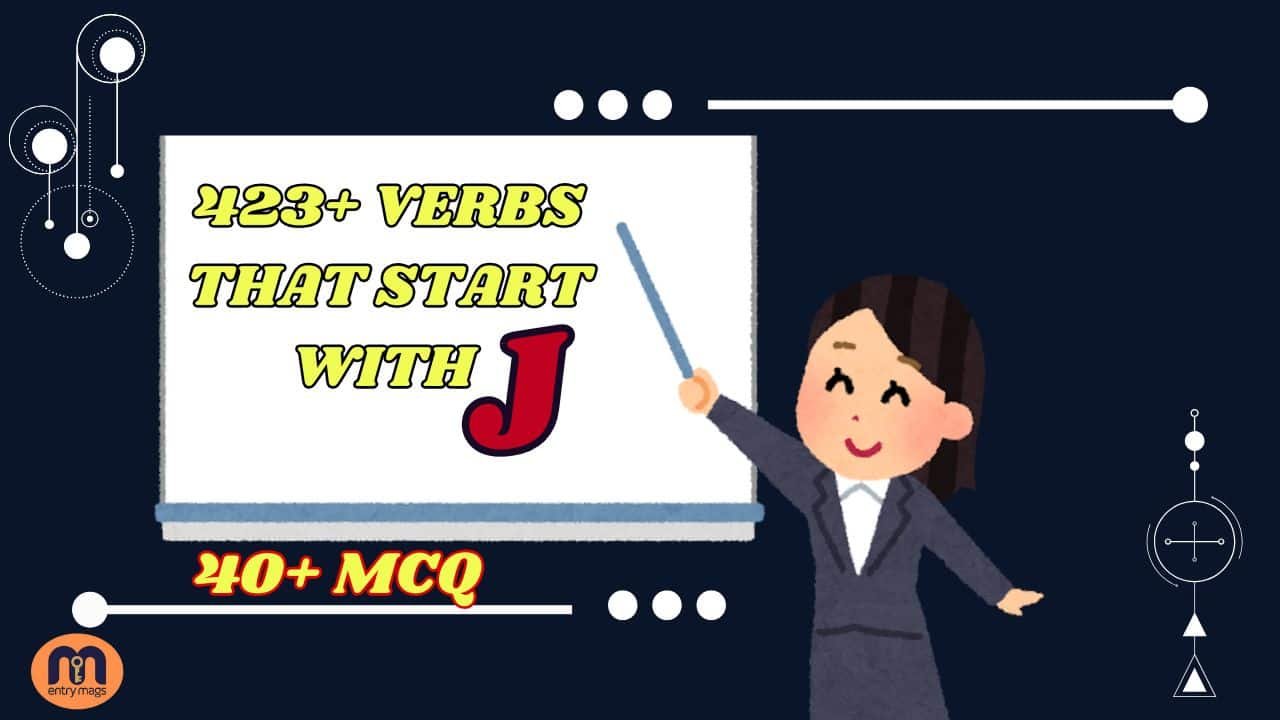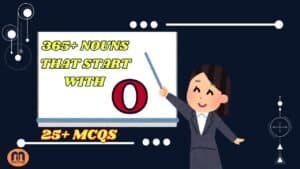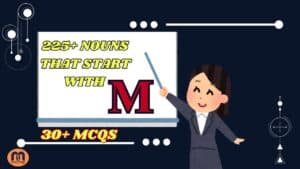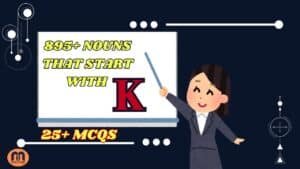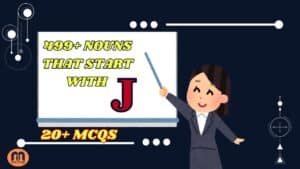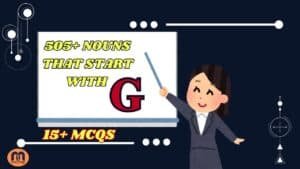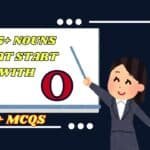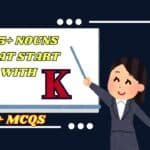Verbs That Start With J: The English language is rich in variety and diversity, with thousands of verbs that help to convey action, state, or occurrence.
Verbs are crucial to forming sentences, telling stories, and expressing emotions. Among the many verbs in English, those that start with the letter “J” add a unique flair to your vocabulary.
Whether you’re a student, a professional writer, or just someone looking to enhance their language skills, knowing these verbs can elevate your communication skills.
So, let’s dive into over 423+ verbs that start with “J” and explore how to use them in daily conversations, writing, and much more.
Why Are Verbs Important?
Verbs are the backbone of any sentence they tell us what the subject is doing or what is happening. Without verbs, language would lack direction and action.
Verbs starting with “J” offer a range of uses, from expressing simple actions to portraying more complex emotions or thoughts. Understanding a variety of verbs can make your speaking and writing more dynamic, vivid, and precise.
The Power of “J” Verbs
While “J” might not be the most common starting letter for verbs in English, it does feature some incredibly useful and versatile ones.
Whether you are describing an action, movement, or change of state, verbs that begin with “J” can come in handy.
Let’s take a closer look at some of these verbs and how they can be used in context.
Common Verbs That Start With J
Here’s a collection of some commonly used verbs that start with the letter “J”. These verbs span various contexts, from everyday actions to more formal or specialized usage.
Join
- Meaning: To become a member or participant in something.
- Example: “I plan to join the gym next week to improve my fitness.”
Jump
- Meaning: To spring off the ground, usually with the feet.
- Example: “The cat jumped over the fence to escape.”
Juggle
- Meaning: To toss several objects into the air and catch them, or to handle multiple tasks.
- Example: “She’s learned to juggle work and family life with ease.”
Judge
- Meaning: To form an opinion about something or someone after consideration.
- Example: “It’s not right to judge people based on first impressions.”
Joke
- Meaning: To make a humorous statement or action.
- Example: “He likes to joke around with his friends after school.”
Jeopardize
- Meaning: To put something at risk or in danger.
- Example: “His actions could jeopardize the entire project.”
Less Common But Interesting Verbs That Start With J
In addition to the commonly used verbs, there are others that can add flavor to your vocabulary, especially in creative or professional settings. These verbs might not be as common but are still valuable.
Jolt
- Meaning: To move suddenly or cause something to do so, usually with force.
- Example: “The car jolted as it hit the speed bump.”
Jibe
- Meaning: To agree or match, often used in the context of opinions or statements.
- Example: “Her account of the story didn’t jibe with his version.”
Jail
- Meaning: To put someone in prison or detain them.
- Example: “The suspect was jailed pending the trial.”
Jag
- Meaning: To cut or break something unevenly or to experience something in a sudden, intense manner.
- Example: “She went on a shopping jag and bought a lot of new clothes.”
Jostle
- Meaning: To push or bump against someone, often in a crowded space.
- Example: “The crowd jostled for a better view of the stage.”
Unique and Rare Verbs Starting with J
These verbs are not frequently encountered but are nonetheless fascinating and worthy of exploration. Using them can make your speech or writing more sophisticated.
Jazz
- Meaning: To perform or create music in a lively and improvisational manner.
- Example: “She loves to jazz up old songs with modern arrangements.”
Jell
- Meaning: To become firm, set, or develop into a clear form.
- Example: “The plan didn’t start to jell until after the meeting.”
Jeremiah
- Meaning: To lament or express sorrow, derived from the biblical figure who lamented the state of his people.
- Example: “He spent hours jeremiah-ing about the state of the economy.”
Jeer
- Meaning: To mock or insult in a loud, contemptuous manner.
- Example: “The audience began to jeer at the performer’s mistakes.”
Jump Into Action with Verbs That Start with J
Verbs that start with “J” are full of energy and action. These verbs will help you describe everything from physical movements to powerful emotions.
- Jump – “She jumped over the hurdle effortlessly.”
- Juggle – “He can juggle five balls at once.”
- Join – “I decided to join the running club.”
- Jerk – “She jerked her head back in surprise.”
- Jostle – “People jostled to get a better view of the stage.”
- Jibe – “Their stories didn’t jibe with each other.”
- Jail – “He was jailed for committing the crime.”
- Jeopardize – “Careless actions could jeopardize the project.”
- Jive – “Their dance moves really jive together.”
- Jolt – “The car jolted when it hit the pothole.”
- Jeer – “The audience began to jeer at the actor.”
- Junk – “He decided to junk the old television.”
- Jangle – “The keys jangled as she ran down the street.”
- Juggle – “She had to juggle work and study at the same time.”
- Jolt – “The sudden jolt woke everyone up.”
- Jailbreak – “There was a jailbreak at the local prison.”
- Jumpstart – “A coffee break helped jumpstart my morning.”
- Jinx – “Don’t jinx the game by talking about it.”
- Jack – “They had to jack up the car to fix the tire.”
- Jazz – “She likes to jazz up old songs with new beats.”
- Jab – “He jabbed at the target with the sword.”
- Jailbreak – “The prisoners planned a jailbreak.”
- Jump – “He jumped off the bridge into the river.”
- Jostle – “They jostled for a place in line.”
- Jerk – “He jerked the door open after hearing the knock.”
- Jeer – “The crowd began to jeer when the team lost.”
- Jeopardize – “His reckless behavior could jeopardize their safety.”
- Juggle – “She tried to juggle between her family and job.”
- Jive – “They jived to the beat of the music.”
- Jingle – “The keys jingle in his pocket as he walks.”
Jolt Your Vocabulary with Powerful J-Verbs
These verbs starting with “J” are packed with energy, perfect for giving your vocabulary an exciting boost. They convey powerful emotions, movements, and situations.
- Jolt – “The car gave a jolt as it hit a bump.”
- Jump – “She jumped over the fence with ease.”
- Juggle – “He tried to juggle his work and personal life.”
- Join – “You should join the team for lunch.”
- Jerk – “She jerked the rope to get his attention.”
- Jostle – “The crowd began to jostle each other for the best view.”
- Jeopardize – “His actions could jeopardize the entire operation.”
- Jive – “They both started to jive to the music.”
- Jeer – “The audience jeered at the actor’s poor performance.”
- Junk – “We need to junk the old furniture in the attic.”
- Jab – “He jabbed the button on the remote.”
- Jail – “The thief was jailed for his crimes.”
- Jazz – “She likes to jazz up the presentation with color.”
- Jingle – “The coins jingled in his pocket.”
- Jibe – “Her words didn’t jibe with the facts.”
- Juggle – “He had to juggle multiple projects at work.”
- Jinx – “Don’t talk about the score, you’ll jinx us.”
- Jab – “He jabbed at the sand with a stick.”
- Jumpstart – “A fresh idea will jumpstart the team’s morale.”
- Jangle – “The keys jangled loudly as she walked.”
- Jangle – “The noise of the machines jangled in my ears.”
- Jerk – “He jerked the chair away from the table.”
- Jailbreak – “The authorities are investigating the jailbreak.”
- Jeopardize – “Don’t jeopardize your future by making hasty decisions.”
- Jive – “Their personalities really jive well together.”
- Junk – “He decided to junk the broken laptop.”
- Jump – “She jumped in excitement when she won the prize.”
- Jab – “He jabbed the fork into the cake.”
- Jostle – “They had to jostle through the crowd to catch the train.”
- Jangle – “The church bells jangled every morning at 6 AM.”
Join the J-Club with These Common Verbs
This section features the most common “J” verbs, which are easy to incorporate into both everyday and formal situations. They are the verbs you’ll often find in conversations and stories.
- Join – “She decided to join the club after the meeting.”
- Jump – “The rabbit jumped into the bushes.”
- Juggle – “He tried to juggle both his studies and hobbies.”
- Jerk – “She jerked the curtain open to look outside.”
- Jostle – “They jostled for a better seat at the movie theater.”
- Jibe – “Their comments didn’t jibe with the situation.”
- Jeopardize – “Your actions might jeopardize the entire project.”
- Jive – “The two dancers really jive on stage.”
- Jeer – “The crowd began to jeer at the losing team.”
- Junk – “He decided to junk the old refrigerator.”
- Jab – “He jabbed at the paper with his pen.”
- Jail – “He was jailed after being caught for theft.”
- Jingle – “The coins jingled in his pocket as he walked.”
- Jailbreak – “A jailbreak occurred in the prison last night.”
- Jolt – “The earthquake caused a sudden jolt.”
- Junk – “We need to junk that old, broken chair.”
- Jumpstart – “We need to jumpstart this project before the deadline.”
- Jinx – “Please don’t jinx our chances by saying we’re winning.”
- Jazz – “She loves to jazz up old songs.”
- Juggle – “He learned how to juggle fire in circus school.”
- Jangle – “The keys jangled as he ran out the door.”
- Jerk – “He jerked his hand away after touching the stove.”
- Jeopardize – “He didn’t want to jeopardize their safety by driving fast.”
- Jive – “Their personalities jive perfectly in the band.”
- Jab – “He jabbed the needle into the apple.”
- Jostle – “They had to jostle through the crowded market.”
- Jeer – “The crowd jeered at the comedian’s poor performance.”
- Jangle – “The loud noise of the machines jangled my nerves.”
- Jinx – “Talking about success too early might jinx it.”
- Jumpstart – “He jumpstarted the car with jumper cables.”
Jive with Dynamic Verbs Starting with J
Dynamic verbs are full of action and help bring life to any conversation. These “J” verbs are great for telling stories, describing movement, or adding drama to your writing.
- Jive – “The dancers really jived to the upbeat music.”
- Join – “She asked if I would join her for coffee.”
- Juggle – “He managed to juggle three meetings in one day.”
- Jerk – “He jerked his shoulder when the ball hit him.”
- Jostle – “We had to jostle for a good spot at the concert.”
- Jeer – “The fans jeered as the team left the field.”
- Jeopardize – “He didn’t want to jeopardize his relationship by being too busy.”
- Jump – “The child jumped over the puddle.”
- Jab – “He jabbed his finger at the map.”
- Jail – “The suspect was jailed after being convicted.”
- Jolt – “The boat jolted when it hit the sand.”
- Jazz – “She likes to jazz up her wardrobe with accessories.”
- Jingle – “The jingle on the radio was catchy.”
- Junk – “They junked their old washing machine and bought a new one.”
- Jibe – “Their story didn’t jibe with the evidence.”
- Jinx – “Don’t talk about the match before it’s over, you might jinx it.”
- Juggle – “She had to juggle multiple tasks at once.”
- Jolt – “The sudden jolt of the train woke him up.”
- Jailbreak – “The inmates planned a jailbreak.”
- Jeer – “The crowd began to jeer at the contestant.”
- Junk – “You should junk that old phone; it’s no longer useful.”
- Jive – “Their voices really jive together in the song.”
- Jab – “He jabbed the stick into the sand to mark the spot.”
- Jeopardize – “Careless decisions could jeopardize the company’s success.”
- Jump – “He jumped into the lake to cool off.”
- Jostle – “We had to jostle for a seat at the theater.”
- Jangle – “The loud jangle of the alarm broke the silence.”
- Jerk – “She jerked the blanket off when she got too hot.”
- Jail – “They put him in jail for violating his probation.”
- Jive – “The dancers jived in perfect rhythm.”
Jolt Your Creativity with Unique J-Verbs
Verbs starting with “J” can be a wonderful tool to enhance your writing. Whether you’re crafting a story, creating dialogue, or describing an event, these verbs can add unique flair and clarity to your work.
- Jump – “She jumped across the rock to avoid getting wet.”
- Join – “I will join you for dinner after my meeting.”
- Juggle – “She juggled two phones while answering emails.”
- Jerk – “He jerked his arm away from the hot stove.”
- Jostle – “The children jostled for position at the starting line.”
- Jive – “They really jived with the rhythm of the song.”
- Jab – “He jabbed the pencil into the paper to draw a line.”
- Jail – “After the trial, the criminal was jailed for ten years.”
- Jeopardize – “Your careless actions could jeopardize the team’s efforts.”
- Jeer – “The crowd began to jeer at the football team’s poor performance.”
- Jangle – “The metal chains jangled as they moved along the street.”
- Jazz – “Let’s jazz up this room with some colorful decorations.”
- Junk – “He decided to junk his old phone after getting a new model.”
- Jive – “Her dance moves jived perfectly with the music.”
- Jolt – “The jolt from the sudden stop shook everyone in the car.”
- Jailbreak – “The jailbreak at the local prison was all over the news.”
- Jinx – “Don’t talk about the project before it’s finished—don’t jinx it!”
- Jumble – “The items in the box were all jumbled together.”
- Junk – “They had to junk their old car after it broke down for the last time.”
- Jive – “The choreography was intense, and everyone had to jive at the same time.”
- Jerk – “He jerked the lever in an attempt to start the machine.”
- Jeopardize – “Their careless attitude could jeopardize the whole plan.”
- Juggle – “She had to juggle between school, work, and her social life.”
- Jab – “He jabbed at the target with his sword.”
- Jangle – “The sound of keys jangling echoed in the hallway.”
- Jail – “The suspect was jailed pending further investigation.”
- Jeer – “The audience began to jeer as the performer faltered.”
- Jolt – “I was jolted awake by the loud noise outside.”
- Junk – “They decided to junk all the outdated furniture in the office.”
- Jumpstart – “A good night’s rest will jumpstart your energy for the day.”
Jive and Groove with Vibrant Verbs That Start with J
Verbs that start with “J” can help add flair to your writing, making it more dynamic and engaging. These verbs capture energy and movement, helping you express actions and feelings vividly.
- Jive – “The dancers jived to the beat of the music.”
- Juggle – “She managed to juggle work, family, and personal commitments.”
- Jump – “He jumped from the rock into the cool water below.”
- Jeopardize – “By skipping the deadline, you jeopardize the whole project.”
- Jerk – “He jerked his hand back from the burning stove.”
- Jostle – “The crowd began to jostle for a good position near the stage.”
- Jail – “He was jailed after being convicted of the crime.”
- Jazz – “She decided to jazz up her presentation with vibrant colors.”
- Jingle – “The coins jingled in her pocket as she walked.”
- Jab – “He jabbed his finger toward the chart on the wall.”
- Jangle – “The sound of jangled keys echoed through the hallway.”
- Join – “I think I will join the team for lunch today.”
- Jeer – “The crowd began to jeer when the team lost the game.”
- Jinx – “You might jinx us if you talk about winning before the game is over.”
- Jolt – “The sudden jolt of the bus woke him up from his nap.”
- Jailbreak – “There was a daring jailbreak at the maximum-security prison.”
- Jumble – “All of his clothes were jumbled up in a pile on the floor.”
- Jive – “The group’s movements jived perfectly with the rhythm.”
- Jumpstart – “A quick workout can jumpstart your energy for the day.”
- Junk – “They decided to junk the old furniture after the move.”
- Jab – “He jabbed at the stick to test the strength of the wood.”
- Jolt – “The jolt from the car’s sudden stop made everyone lean forward.”
- Jungle – “The explorers were stuck in the dense jungle for days.”
- Jeopardize – “His actions could jeopardize the project if not addressed soon.”
- Juggle – “She had to juggle multiple deadlines for work.”
- Jangle – “The metal keys jangled in his hand as he searched for the right one.”
- Jail – “The man was jailed for his involvement in the crime.”
- Jive – “Their steps seemed to jive perfectly during the performance.”
- Jump – “The cat jumped from one rooftop to another.”
- Jerk – “He jerked the door open when he heard the knock.”
Jubilant J-Verbs for Joyous Writing
These verbs starting with “J” can help you describe moments of joy, excitement, and celebration. Use these words to elevate the mood in your writing or speech.
- Jump – “She jumped with joy when she heard the good news.”
- Join – “I decided to join the celebration and dance with everyone.”
- Jive – “The band’s music made everyone jive with happiness.”
- Jolt – “The party guests were jolted into laughter with a funny joke.”
- Jerk – “He jerked his shoulders back in excitement.”
- Jostle – “They jostled for position at the front of the line.”
- Jazz – “She jazzed up her outfit with some colorful accessories.”
- Jingle – “The jingle from the ice cream truck made the kids rush out.”
- Jeer – “The opposing fans began to jeer when the team scored.”
- Jab – “He jabbed at the buttons on the arcade machine.”
- Jeopardize – “You don’t want to jeopardize the fun by being too serious.”
- Juggle – “She juggled planning the party with managing work tasks.”
- Jive – “The dancers jived in perfect harmony with the upbeat rhythm.”
- Jail – “The cheerful mood didn’t last long after the joke landed him in jail.”
- Jolt – “The loud music gave everyone a jolt of energy.”
- Jinx – “They were careful not to jinx their winning streak.”
- Jingle – “The happy sound of jingling bells filled the air.”
- Jungle – “They ventured through the jungle, exploring the wild.”
- Juggle – “She had to juggle preparing for the event while keeping a smile.”
- Jerk – “He jerked back in surprise when the balloon popped.”
- Jangle – “The sound of the jangled instruments made the party lively.”
- Jailbreak – “It was an exciting jailbreak that everyone couldn’t stop talking about.”
- Jeer – “The crowd didn’t hesitate to jeer when the team made a mistake.”
- Jab – “The jab in the match had the crowd cheering in excitement.”
- Jeopardize – “Her laughter never seemed to jeopardize the fun of the gathering.”
- Jumpstart – “A round of applause jumpstarted the team’s motivation.”
- Jive – “Everyone at the event started to jive to the lively tunes.”
- Junk – “They decided to junk the old decorations after the successful party.”
- Jolt – “The surprise announcement gave everyone a jolt of energy.”
- Juggle – “She had to juggle organizing the event and making sure everyone was happy.”
Jive with Energy: Explore Action-Packed J-Verbs
If you’re looking to add some high-energy verbs to your vocabulary, look no further! These “J” verbs are full of action and vitality.
- Jive – “Everyone at the party started to jive with the lively music.”
- Jump – “She jumped from the diving board and made a perfect splash.”
- Juggle – “He learned to juggle three balls at once during his free time.”
- Jerk – “She jerked the wheel to avoid hitting the pothole.”
- Jostle – “The fans jostled each other to get a closer look at the band.”
- Jeopardize – “His careless actions could jeopardize the team’s future.”
- Jab – “He jabbed the knife into the cutting board with precision.”
- Jazz – “She decided to jazz up the design with some creative flair.”
- Jingle – “The bells jingled as she walked down the street.”
- Jeer – “The crowd began to jeer as the performer faltered on stage.”
- Jolt – “The jolt from the ride made everyone scream with excitement.”
- Jail – “After the robbery, he was quickly jailed.”
- Jive – “The dancers’ steps really jived with the beat of the music.”
- Juggle – “He was able to juggle work, study, and his social life effortlessly.”
- Junk – “They had to junk the old broken-down refrigerator.”
- Jeopardize – “Taking risks could jeopardize the integrity of the mission.”
- Jink – “The car jinked suddenly as the driver avoided the oncoming vehicle.”
- Jolt – “The earthquake caused a sudden jolt that startled everyone.”
- Jumpstart – “A new strategy helped jumpstart the team’s productivity.”
- Jailbreak – “The dramatic jailbreak was covered on every news station.”
- Jostle – “Fans jostled for position at the concert venue.”
- Jabber – “He started to jabber nervously when questioned about the missing report.”
- Jumble – “The notes were jumbled in a messy pile.”
- Jive – “Their choreography was impressive, and they jived throughout the performance.”
- Jab – “He jabbed at the opponent during the fencing match.”
- Jeer – “The audience began to jeer at the contestant who faltered.”
- Jolt – “The loud noise from the explosion gave everyone a jolt.”
- Jingle – “The jingle of the shop’s door signaled the arrival of a customer.”
- Junk – “The broken machine was sent to junk after its last repair.”
- Jump – “The frog jumped from one lily pad to the next.”
Juggling with J-Verbs to Enhance Your Language
By using these verbs starting with “J,” you can instantly elevate your storytelling or conversations, making them more vibrant and engaging. These verbs are perfect for action-driven narratives.
- Jump – “She jumped into the conversation with a witty remark.”
- Juggle – “He had to juggle multiple deadlines while maintaining quality.”
- Jerk – “He jerked the wheel sharply to avoid the obstacle.”
- Jostle – “They had to jostle to find space in the crowded room.”
- Jeopardize – “His sudden actions could jeopardize the whole event.”
- Jive – “The dancers jived with each other during the performance.”
- Jab – “He jabbed the stick into the soft ground to measure depth.”
- Junk – “He junked the old couch that had been sitting in his garage.”
- Jail – “After the hearing, the defendant was jailed.”
- Jeer – “The loud jeers from the crowd echoed throughout the stadium.”
- Jangle – “The keys jangled in his pocket as he walked to the door.”
- Jazz – “She jazzed up her presentation with some cool graphics.”
- Jangle – “The sound of the coins jangling in his pocket was unmistakable.”
- Jumpstart – “A quick meeting jumpstarted the team’s focus for the day.”
- Jeopardize – “The decision could jeopardize years of work.”
- Jive – “Their plans really seemed to jive with my own.”
- Jolt – “The sudden jolt woke up the entire room.”
- Jumble – “The papers were all jumbled in a mess across the desk.”
- Jailbreak – “The media frenzy around the jailbreak was overwhelming.”
- Jinx – “They were careful not to jinx the game by talking about it too soon.”
- Jab – “She jabbed the fork into her food and stared at the plate.”
- Junk – “He decided to junk the car after it failed the inspection.”
- Jeer – “The comedian made a joke, and the crowd started to jeer.”
- Jive – “Their stories seemed to jive perfectly together.”
- Jump – “She jumped at the chance to visit Paris.”
- Jolt – “The jolt from the ride made my stomach flip.”
- Juggle – “She could juggle multiple tasks effortlessly.”
- Jail – “The prisoner spent years in jail before his release.”
- Junk – “You should junk that broken TV; it’s taking up space.”
- Jive – “Their performance was lively, and they really jived with the audience.”
Jovial J-Verbs to Elevate Your Writing
Verbs starting with “J” have a way of creating lively, energetic scenes. Whether you’re writing creatively or in a more structured setting, these verbs add zest to any context.
- Jive – “The couple jived gracefully on the dance floor.”
- Jump – “The athlete jumped high to make the dunk.”
- Juggle – “She could juggle many responsibilities without breaking a sweat.”
- Jerk – “He jerked the curtain open to see what was happening outside.”
- Jostle – “The shoppers jostled to find the best deals.”
- Jeopardize – “His careless actions jeopardized the safety of others.”
- Jab – “She jabbed the pen into the paper to write quickly.”
- Jail – “The fugitive was caught and jailed after a long pursuit.”
- Jeer – “The audience jeered as the performer stumbled on stage.”
- Jazz – “He loved to jazz up his look with colorful ties.”
- Jingle – “The jingle of bells signaled the arrival of the holiday season.”
- Jolt – “The shock from the jolt sent him stumbling.”
- Junk – “We need to junk that old laptop; it doesn’t work anymore.”
- Jumpstart – “A motivational speech jumpstarted the team’s productivity.”
- Jive – “Their humor and personalities jived well together.”
- Jumble – “The room was a jumble of clothes, books, and papers.”
- Jailbreak – “The jailbreak was reported across all news outlets.”
- Jinx – “You can’t talk about winning yet, or you’ll jinx us.”
- Juggle – “He had to juggle work, school, and family time.”
- Jeopardize – “Overworking yourself could jeopardize your health.”
- Jolt – “The unexpected jolt from the car made her drop the coffee.”
- Jeer – “The audience jeered when the actor forgot his lines.”
- Jab – “He jabbed the sword at his opponent during the duel.”
- Junk – “They decided to junk the old, rusted bikes in the garage.”
- Jump – “She jumped across the puddle with a little hop.”
- Jostle – “They had to jostle to get to the front of the crowd.”
- Jingle – “The jingles played softly on the radio.”
- Jive – “Their actions jived well with the plan.”
- Jail – “The thief was jailed for his crimes.”
- Jerk – “He jerked away when the cat scratched him.”
How To Use Verbs Starting with J in Your Writing and Speaking
The key to using any verb effectively lies in context and clarity. Here’s how you can incorporate these “J” verbs seamlessly into your everyday language:
1. Describing Action or Movement
Verbs like jump, jog, and jostle are great for illustrating physical movement. Whether you’re writing about a sporting event or describing the actions of a character in a story, these verbs can help make the narrative more dynamic.
2. Expressing Opinion or Judgment
If you need to describe decision-making or evaluations, verbs like judge, jibe, and jeopardize are invaluable. For instance, when discussing a group project, you might say, “We need to judge the effectiveness of our proposal before moving forward.”
3. Adding Humor or Lightness
Using verbs like joke or jive can help create a playful tone. These are ideal when you want to lighten up the mood or express wit in your writing or conversation.
4. Conveying Emotional Responses
Verbs such as jeer or juggle can convey how characters or people respond emotionally in different scenarios. These verbs can add emotional depth, making your communication more engaging and relatable.
Conclusion
Mastering verbs that start with the letter “J” is not just a fun language exercise but a practical way to enhance your vocabulary.
Whether you’re crafting compelling stories, writing professional reports, or simply trying to improve your communication skills, these verbs are essential tools in your linguistic toolkit.
Now that you’ve discovered over 423+ verbs that start with “J”, why not challenge yourself to use a few of them in your next conversation or piece of writing?
The more you practice, the more natural it will feel to incorporate a diverse range of verbs into your language.
So go ahead jump into the world of “J” verbs, and watch how they can jazz up your communication!
MCQs: Verbs That Start With “J”
1. Which of the following verbs means “to perform actions with quick or jerky movements”?
A) Jive
B) Jerk
C) Jump
D) Jangle
Answer: B) Jerk
Explanation: “Jerk” refers to a sudden or sharp movement.
2. Which verb means “to add creative or lively elements to something”?
A) Jumpstart
B) Jingle
C) Jazz
D) Jostle
Answer: C) Jazz
Explanation: “Jazz” means to make something more lively or creative.
3. Which of these verbs is related to moving rapidly to get past others, especially in a crowd?
A) Jab
B) Jail
C) Jostle
D) Junk
Answer: C) Jostle
Explanation: “Jostle” means to push or shove against others, often in a crowded situation.
4. What does the verb “jeopardize” mean?
A) To jump to conclusions
B) To start something quickly
C) To put something at risk or danger
D) To perform a dance move
Answer: C) To put something at risk or danger
Explanation: “Jeopardize” means to put someone or something in danger or at risk.
5. Which verb is used when referring to a loud sound produced by bells or small metallic objects?
A) Jive
B) Jingle
C) Juggle
D) Jail
Answer: B) Jingle
Explanation: “Jingle” refers to a light, ringing sound, often made by bells or small metal objects.
6. Which of the following verbs means “to join together or bring people into a group”?
A) Jump
B) Juggle
C) Jail
D) Join
Answer: D) Join
Explanation: “Join” means to become part of something or to bring people or things together.
7. Which verb means “to engage in an activity requiring dexterity and coordination, often involving multiple objects”?
A) Jump
B) Juggle
C) Jostle
D) Jive
Answer: B) Juggle
Explanation: “Juggle” refers to keeping multiple objects in motion in the air or managing multiple tasks at once.
8. What action does the verb “jab” describe?
A) To move away quickly
B) To push something with quick and sharp motions
C) To engage in a friendly debate
D) To run rapidly
Answer: B) To push something with quick and sharp motions
Explanation: “Jab” refers to thrusting something with a quick, sharp movement.
9. Which verb is commonly associated with singing or dancing in rhythm, especially to upbeat music?
A) Jolt
B) Jive
C) Jeer
D) Jail
Answer: B) Jive
Explanation: “Jive” refers to dancing or moving to a rhythm, often associated with lively music.
10. Which verb means “to fail to accomplish something due to an unforeseen factor or bad luck”?
A) Juggle
B) Jinx
C) Jailbreak
D) Jeopardize
Answer: B) Jinx
Explanation: “Jinx” refers to bringing bad luck or causing something to fail due to superstition.
11. Which verb would you use if someone is taken into custody after committing a crime?
A) Jail
B) Jive
C) Jostle
D) Junk
Answer: A) Jail
Explanation: “Jail” means to imprison someone, typically after a legal proceeding.
12. What does the verb “junk” mean in a modern context?
A) To give up or abandon something
B) To sell something valuable
C) To improve an object
D) To organize an event
Answer: A) To give up or abandon something
Explanation: “Junk” refers to throwing away or discarding something that is no longer useful.
13. Which verb describes the action of moving quickly from one place to another, often with a sense of suddenness or urgency?
A) Jump
B) Jangle
C) Jailbreak
D) Jolt
Answer: A) Jump
Explanation: “Jump” describes a quick, sudden movement from one position to another, often involving height.
14. Which verb means to make a sound like metal clinking together?
A) Jingle
B) Jumpstart
C) Jive
D) Jostle
Answer: A) Jingle
Explanation: “Jingle” refers to the ringing sound made by small metallic objects, such as keys or bells.
15. Which verb means to disrupt or forcefully remove someone or something from its position?
A) Jolt
B) Jumble
C) Jostle
D) Jive
Answer: C) Jostle
Explanation: “Jostle” refers to pushing or moving something out of its place, often with force.
16. Which of the following verbs means “to start something quickly, especially after a pause”?
A) Jumpstart
B) Juggle
C) Jive
D) Jeer
Answer: A) Jumpstart
Explanation: “Jumpstart” means to begin something with energy or to restart it after a pause.
17. Which verb describes a scenario in which you take an item that is broken or useless and discard it?
A) Junk
B) Jinx
C) Jail
D) Jeopardize
Answer: A) Junk
Explanation: “Junk” means to throw something away, especially if it’s considered no longer useful.
18. Which verb is often used in reference to someone who is harshly criticizing or mocking someone?
A) Jive
B) Jail
C) Jeer
D) Jangle
Answer: C) Jeer
Explanation: “Jeer” refers to mocking or laughing at someone in a contemptuous manner.
19. What does it mean to “jeopardize” something in a professional setting?
A) To complicate it
B) To put it at risk
C) To complete it early
D) To ignore it
Answer: B) To put it at risk
Explanation: “Jeopardize” means to endanger or risk something, such as a project or opportunity.
20. Which verb is commonly used in situations involving risk, like a dangerous move or act?
A) Jolt
B) Jump
C) Jail
D) Jeopardize
Answer: D) Jeopardize
Explanation: “Jeopardize” refers to putting something in danger or at risk of failure.
21. Which verb refers to a quick, sharp, and sudden action, often in a physical context?
A) Jive
B) Jab
C) Jostle
D) Junk
Answer: B) Jab
Explanation: “Jab” means to thrust or push something quickly and sharply, typically in a physical or defensive context.
22. Which verb means to make a sudden, forceful movement or to shake abruptly?
A) Jump
B) Jangle
C) Jolt
D) Jive
Answer: C) Jolt
Explanation: “Jolt” refers to a sudden, forceful shake or movement, often caused by an impact or shock.
23. Which of the following verbs is used when referring to the process of manipulating or managing multiple tasks or objects at once?
A) Jingle
B) Juggle
C) Jail
D) Jeer
Answer: B) Juggle
Explanation: “Juggle” is commonly used to describe managing multiple tasks or objects simultaneously with skill or dexterity.
24. Which verb refers to starting something or giving it energy, often after a period of inactivity?
A) Jump
B) Jumpstart
C) Jerk
D) Jailbreak
Answer: B) Jumpstart
Explanation: “Jumpstart” means to begin something energetically, often after a period of pause or inactivity.
25. Which verb describes a playful or rhythmic dance movement, especially in upbeat music genres?
A) Jive
B) Juggle
C) Jab
D) Jeer
Answer: A) Jive
Explanation: “Jive” is a type of dance or movement to fast-paced, rhythmic music, often associated with jazz or swing.
26. What action does the verb “jeopardize” describe in a risky scenario?
A) To compromise the safety or success of something
B) To dance to rhythm
C) To abandon something without cause
D) To make a sudden decision
Answer: A) To compromise the safety or success of something
Explanation: “Jeopardize” means to put something or someone in danger or at risk of harm.
27. Which verb would you use when describing the action of moving quickly or forcefully, often with a lot of energy?
A) Jail
B) Jostle
C) Junk
D) Jerk
Answer: B) Jostle
Explanation: “Jostle” refers to pushing or moving against others, especially in crowded situations, with force.
28. What does the verb “jeer” mean in the context of a group of people mocking someone?
A) To encourage
B) To laugh or mock in a disrespectful way
C) To cheer loudly
D) To help someone
Answer: B) To laugh or mock in a disrespectful way
Explanation: “Jeer” refers to laughing or making fun of someone in a hurtful or mocking manner.
29. Which verb means to interact or engage with someone in a friendly, yet competitive, manner?
A) Jive
B) Jostle
C) Jumpstart
D) Jail
Answer: B) Jostle
Explanation: While “jostle” can refer to physical pushing, it can also be used metaphorically to describe competing or interacting in a lively or slightly aggressive manner.
30. Which verb means to cancel, dispose of, or get rid of something that is no longer useful?
A) Junk
B) Jive
C) Jail
D) Jangle
Answer: A) Junk
Explanation: “Junk” means to discard or dispose of something, usually because it is no longer needed or valuable.
31. Which verb refers to moving in a way that involves strong physical motions or jerks?
A) Jump
B) Jolt
C) Jingle
D) Juggle
Answer: B) Jolt
Explanation: “Jolt” refers to a sudden, forceful movement or shaking, often from an unexpected force.
32. Which verb means “to sing or perform in a rhythmic, often catchy, way”?
A) Jive
B) Jailbreak
C) Jumble
D) Jostle
Answer: A) Jive
Explanation: “Jive” can also refer to lively, rhythmic music or dance, typically performed in a joyful manner.
33. Which verb means to place someone in a cell or a holding area, typically as a result of an arrest?
A) Juggle
B) Jail
C) Jostle
D) Jump
Answer: B) Jail
Explanation: “Jail” refers to imprisoning or detaining someone, usually in a police station or correctional facility.
34. Which verb refers to a noisy, chaotic, or unpleasant sound, like that of metal objects clinking together?
A) Jolt
B) Jingle
C) Jab
D) Junk
Answer: B) Jingle
Explanation: “Jingle” refers to the light, metallic sound, often produced by small objects like bells or keys.
35. Which verb refers to the act of criticizing or mocking someone in a light-hearted or often unkind manner?
A) Jail
B) Jeer
C) Jump
D) Jive
Answer: B) Jeer
Explanation: “Jeer” means to mock or criticize someone in a disrespectful or teasing manner.
36. Which verb means to engage in or perform an action in a competitive or rough manner, often by physically forcing others aside?
A) Jail
B) Jostle
C) Juggle
D) Jeopardize
Answer: B) Jostle
Explanation: “Jostle” refers to physically pushing or shoving others, often in a competitive or crowded environment.
37. Which of the following verbs means to disrupt something or make it chaotic, typically by moving quickly and with force?
A) Jumpstart
B) Juggle
C) Jolt
D) Jeopardize
Answer: C) Jolt
Explanation: “Jolt” refers to a sudden, often sharp movement that disrupts the normal state of something.
38. Which verb describes performing a task in an exaggerated or playful way, often in reference to showing skill?
A) Jab
B) Juggle
C) Jail
D) Jostle
Answer: B) Juggle
Explanation: “Juggle” refers to skillfully handling multiple tasks or objects at once, often with dexterity.
39. Which verb means to add creative touches or transform something into a livelier, more appealing version?
A) Jumpstart
B) Jive
C) Jazz
D) Jeer
Answer: C) Jazz
Explanation: “Jazz” means to make something more exciting, creative, or lively, often referring to enhancing something artistically.
40. Which of the following verbs describes someone or something moving in a way that creates a sharp, sudden action or momentary disturbance?
A) Jerk
B) Jail
C) Jingle
D) Junk
Answer: A) Jerk
Explanation: “Jerk” describes a sudden, sharp movement or disturbance, typically with force.
Read more knowledgeable blogs on Entry Mags
